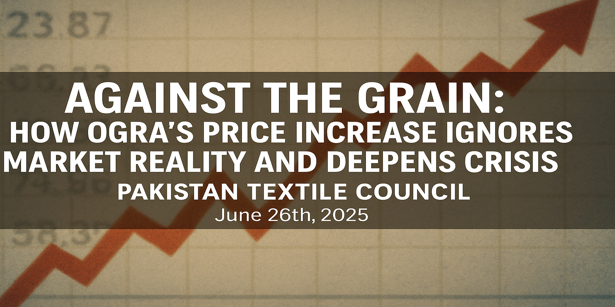Annual Meeting of Pakistan Textile Council – 30th August 2025 – Karachi
Against The Grain: How OGRA’s Price Increase Ignores Market Reality And Deepens Crisis
admin
June 26, 2025
Blog

Writer: MR. ASIM RIAZ AN ESTABLISHED ENERGY EXPERT, M.PHIL. STRATEGIC STUDIES NDU,MASTERS IN ENERGY MANAGEMENT CIIT, B.SC. (MECHANICAL) UET, BS. MATH-PHYSICS PU.
During both the public hearing and in their formal written submission to OGRA, the petitioners raised material objections to the underlying cost assumptions embedded in the SNGPL Estimated Revenue Requirement (ERR) for FY 2025–26. In its determination dated May 20, 2025, the Authority incorporated a Re-Gasified Liquefied Natural Gas (RLNG) diversion cost of PKR 3,056.07 per MMBtu, benchmarked against elevated Brent crude oil price assumptions. This pricing basis translates into a notional financial impact of PKR 242.481 billion for 79.34 million MMBtu, equivalent to approximately 24.8 LNG cargoes.
OGRA Should Review its Decision on SNGPL’s Revenue Requirement Increase to PKR 1,895.25/MMBtu
Historically, actual settlement values for RLNG diverted to the domestic sector have remained significantly below notified RLNG tariffs. This differential introduces a structural distortion that undermines cost-reflective tariff design and contravenes Section 8(2)(b) of the OGRA Ordinance, 2002, which mandates that tariffs to be cost-reflective and market-aligned benchmarks.
During the hearing, the petitioners submitted that SNGPL has forecast a surplus of 400 MMCFD of RLNG over the fiscal year. Against this backdrop, they recommended a downward revision to the Brent crude assumption, however, in OGRA decision, it was set at US$ 75.33 per barrel. Forecasts from leading institutions, including Goldman Sachs, project an average of USD 63 per barrel for 2025. As of June 24, 2025, Brent crude is priced at USD 68.39 per barrel, having receded from a recent peak of USD 78.50 amid regional geopolitical tensions.
For an import-dependent energy system such as Pakistan’s, where pricing is predominantly Brent-linked, volatility in global oil prices poses significant macroeconomic risk. A USD 5 increase in Brent can escalate the national energy import bill by over USD 1 billion annually, exerting pressure on the current account, accelerating inflation, and contributing to exchange rate depreciation.
The accumulation of surplus RLNG and its diversion to low-revenue consumer segments has materially contributed to the exponential growth of circular debt in the power and gas sectors, which now exceeds PKR 5 trillion, reflecting systemic inefficiencies and a breakdown in cost-recovery mechanisms.
Given that wellhead pricing under legacy and post-2012 Petroleum Policies is contractually indexed to international crude benchmarks such as Brent and HSFO, elevated reference prices not only inflate RLNG diversion cost estimates but also result in a parallel and unwarranted escalation in the notified price of indigenous gas. This compounds end-user tariff pressures and weakens adherence to cost-reflective pricing principles.
Petitioners had recommended that OGRA consider a reversion toward the last notified prescribed price of PKR 1,778.35 per MMBtu, issued on December 17, 2024. This rate was more consistent with then-prevailing Brent trends and RLNG procurement fundamentals. However, OGRA raised the prescribed price to PKR 1,895.25 per MMBtu, reflecting a 6.57 percent increase despite contrary market indicators and an evolving surplus scenario.
In view of the above, there is insufficient justification for any further upward revision in end-consumer gas prices. On the contrary, prevailing global market fundamentals and domestic RLNG availability provide a strong basis for downward adjustment to restore industrial competitiveness, consumer affordability, and regulatory consistency.
It is respectfully submitted that OGRA undertake a comprehensive reassessment of the macroeconomic inputs, RLNG pricing benchmarks, and volume-related assumptions forming the basis of the FY 2025–26 ERR. Such a review is critical to ensuring alignment with OGRA’s statutory mandate under Sections 7(1)(c) and 8(2)(a) of the OGRA Ordinance, 2002. This will promote transparency, economic efficiency, and long-term sectoral sustainability in the public interest.
Recent Posts
News
Blog
Have Any Question?
- +92 51 2726971
- info@ptc.org.pk
